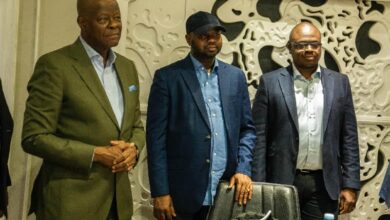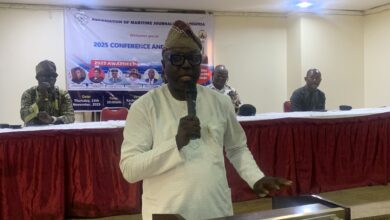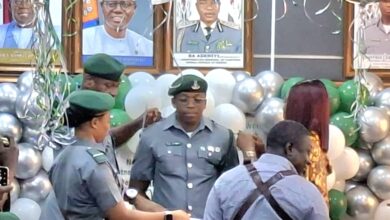Uncategorized
VIN Valuation: Lack of Transparency by Auto Importers is Our Biggest Challenge- Comptroller Yusuf


Comptroller Saidu Abba Yusuf, Customs Area Controller of PTML Command in Lagos has further explained that the VIN valuation process for revenue collection on imported vehicles into Nigeria is running smoothly with improved modifications
Speaking to reporters shortly after his second stakholders meeting in August 2023, Yusuf said the system relies on transparency, harmonization, standardization, and simplification of procedures.
The Area Controller of Nigeria’s model port for automobile cargoes said the VIN system is working well and has been upgraded with an electronic 846 (e846) code to enhance efficiency and reduce human contact in the vehicle clearing process.
Q:We have heard from the headquarters that VIN valuation process is still up and running.As the comptroller of ground can you just give us an overview of the success and challenges in the implementation of the system?
The VIN valuation since it was introduced has been able to streamline the issue of clearance of vehicles from the port.When the VIN valuation was introduced sometimes last year, the basis under which it was introduced was in line with the trade facilitation agreement like I said earlier on while we were having stake holders meeting today.
It was introduced based on the four pillars of trade facilitation agreement which are transparency, harmonization, standardization, and simplification of procedures.Now, the VIN valuation has been able to standardize values within the command and across board.
When we pick up vehicles, we will know precisely how and what to do on them.The only place we are having a bit of challenge is the issue of transparency.Transparency on the part of the declarant is a big challenge in our society. That aspect is supposed to give room for the smooth running of the VIN valuation. When you have a vehicle, you have to be transparent on the transaction value of that vehicle.
You need to tell Customs sincerely so you have to support your declaration with transaction invoice; exactly how much you bought that vehicle.In that way, there is a column where you input that value and when it is accepted, it goes without any hitch.
But most of them already know the base value of so many of these vehicles.Most of the declarants go for the least value on some of these vehicles that they know the system will accept but later require intervention .
lt goes down to transaction value based on identical item and that is where the role of the valuation and examination officers come in. When the declarant makes his declaration with his own transaction value, it goes for examination.

Physically, when the examination officer checks and notice any discrepancy from what is declared ,he makes his input in the inspection act and pass it over back to valuation.Valuation will look at it critically.If the value is accepted, it goes back to the shed and the car will be released.
All these things are put in place to enhance trade facilitation to make sure that values cut across and they are harmonized.So far, I think it has been working very well.The unfortunate thing just like I said is the issue of transparency which led to the recent circular coming up and the circular is not something that is new ,it is not something that is changing any procedure.
The circular is like a guide on how to perform, how examination and valuation officers should perform their jobs better. All those items have been in the system all these while since the VIN valuation was introduced.
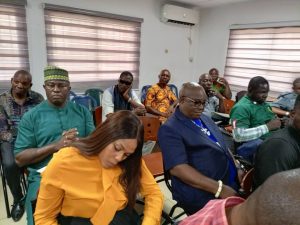
Q:In the course of the sensitization, you talked about reducing human contact. How has this VIN valuation process helped in that regard?
It has worked very effectively, and it has helped in a great deal in reducing human contact because at the comfort of your office, you input your declaration.When you do that, it goes through the system.You don’t need to be physically present in any Customs formation to process your document.
The only place you might be present is during physical examination, probably, but the moment you input your declaration in the DTI, it comes to Customs zone and it is seen .The examination is conducted.From there, if there are any queries, it goes through the system.The examination officer inputs his findings, the valuation officer sees it on the system.That is why we are talking about standard VIN.
When you are talking about the non standard VIN as it is, you are quite aware that the E846 has just been introduced and that is one of the effective system in cutting down human contact.
Gone are the days when you see a large crowd around here. With the E846 system ,the agent passes his declaration application online.From there, it moves to the CAC office who gives approval online and we push it to valuation.
Valuation gives value online.After value is given, it is passed on to the declarant online.So I don’t see any level at which your physical presence would be needed.All these procedures were put in place to enhance international best practice .
They are in line with World Customs Organisation(WHO) procedure, in line with trade facilitation agreement where automation is being encouraged. Human contact goes to the barest minimum, where you ensure that the issue of delays are completely eliminated.
Delays can only come when we have issues with the network which obviously we don’t have power over, but as long as the network is running, I assure you that PTML being a model port, we are on top of our game.
Once your application on E846 is submitted, it doesn’t take time for approval to be given.From there, it is processed to valuation and from valuation you get your value,then you go for your examination.
You can hardly see anybody around.That is the Customs of the 21st century and the future and that is what we are working towards.
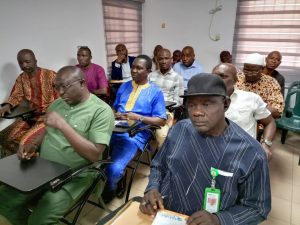
Q:How has PTML fared as regards to Customs community relation under your watch as the Comptroller?
Since I assumed here, we have been trying the best we can to ensure that we get in line with procedures as regards to stake holders. Even sister agencies relationship.We have been on top of our game.
In just this month alone, we have had two stake holders meeting to sensitize and hear from them how our systems and procedures are working. We get feedbacks on how the services we render to them are working .
Today we had the second meeting in the month and I think from the response we are getting, things are moving very well, and about a couple of days ago, I paid courtesy visit to the Director DSS, I had meetings with sister agencies on how we should collaborate especially in the field of being on the same page in terms of avoiding delays
We are all working towards ensuring that the economy of this country moves forward and the issue of trade facilitation is taken seriously.
We don’t want any delay as far as PTML is concerned and as far as the issue of trade facilitation is concerned, we ensure that we are on top of our game.
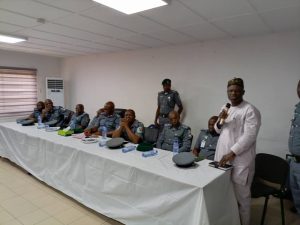
Q:Let’s come to revenue collection.In the face of decreased importation, is there any improvement? How has the intervention like alerts and demand notices helped you in this task?
That is a very crucial and interesting aspect.Since I assumed here, there are structures we put in place.Sometimes, leakages might not be deliberate.Sometimes, if you lack the knowledge of classification, there might be leakage.
Under my watch, officers have been able to have series of consultations.I’ll always encourage them to consult their colleagues on what they don’t know and my office is always open.
From what we know, we have been able to come forward to get together to share knowledge and work on some of our procedures especially classification, I encourage them to consult.Once you have knowledge and once an item is presented , you should be able to collect the appropriate duty you are supposed to collect.
I always encourage them on physical examination.You need to see what you are releasing.You need to make consultation on what is presented to you.Sometimes, some of these chemicals might be wrongly classified and that’s why you need to expand your level of knowledge on chemicals to be able to know if the chemical is appropriately classified .Is the correct duty paid? In that manner, we have been able to really block some of the leakages, we have been able to jerk up the level of collections we have done.
I am very proud to say that in the month of July, for the first time, we have been able to hit over N30.5 billion.In the month of August, we have redoubled our efforts and we are looking at surpassing that.
I commend the officers and everybody for their resilience in placing us on top of our game. We are committed to ensuring our revenue is maximally generated and accurately accounted for.Every Kobo due to government must be paid.
Q:What is the compliance level from the stake holders when you issued out these demand notices?
Like the procedure demands that when demand notice is issued, you need to sit the declarant down, there has to be an interaction.He has to present his own case and you have to present why demand notices have to be issued.
Sometimes it is deliberate, sometimes it is not. Fortunately as it and with the new Customs Act, Section 229, I think everybody would sit up .That new Custom Act is very clear. It says that if knowingly a declarant shortchange the government in the course of his declaration, a penalty of 25 percent is to be applied.
I always made it known to them.Then 229, 2 says in addition to the 25 percent, the individual will be prosecuted and a fine not less than N2 million will be paid.You can see that with that new Act, it is not going to be easy for anybody engaged in false declaration or any declaration with the aim of trying to shortchange the government.
I can assure you that PTML will ensure that section of the new Customs Act will be applied to anybody who acts unlawfully. I have directed my DC enforcement on it. The moment we notice such infraction, we are going to refer any case to enforcement and our legal seat will take charge of that.
Q:Give us an insight into the advanced ruling.To what extent will it facilitate trade and how best can stake holders take maximum advantage of it?
That is a very interesting thing, when I read through the new Custom Act, I think it is a very commendable thing that the Nigeria Customs Service adopts that procedure.It is a procedure that will enhance trade facilitation.It is a procedure that will now bring commitment and would ease the issue of doing the business.
Now , the advanced ruling as it is implies that a declarant is free to make an application to Nigeria Customs to seek clarification on the issue of classification of the item he intends to bring; to seek clarification on value related item; to seek clarification on any other matter in terms of whether this items are under restriction and in the process is going to get a reply from Nigeria Customs Service on the inquiry .
After he gets the reply, it is going to be binding on him and on Nigeria Customs Service.When the importation is done, he is going to have free clearing procedure.But at the same time, in the course of that process, there is a clause that says that those ruling is going to be within a defined period, then it can be withdrawn at any point. That is what the law says and that is section 24 of the new Customs Act .
The details are there, reference can be made to it. I encourage the entire business community to take advantage of that.It is a way of trying to ensure that we have smooth clearance of goods and prevent delays at the point of clearance.





